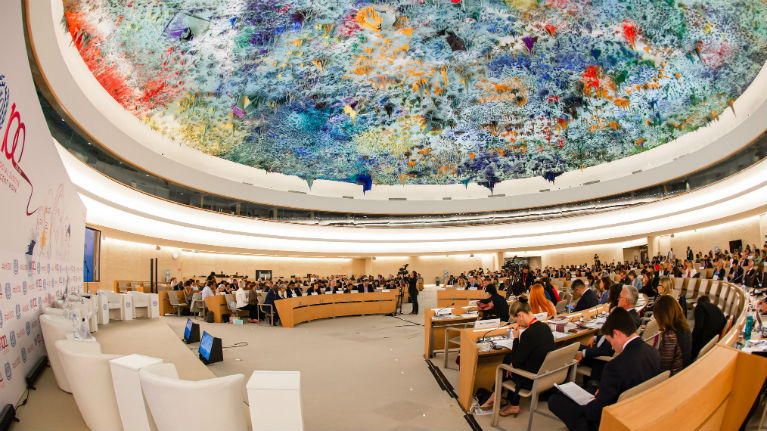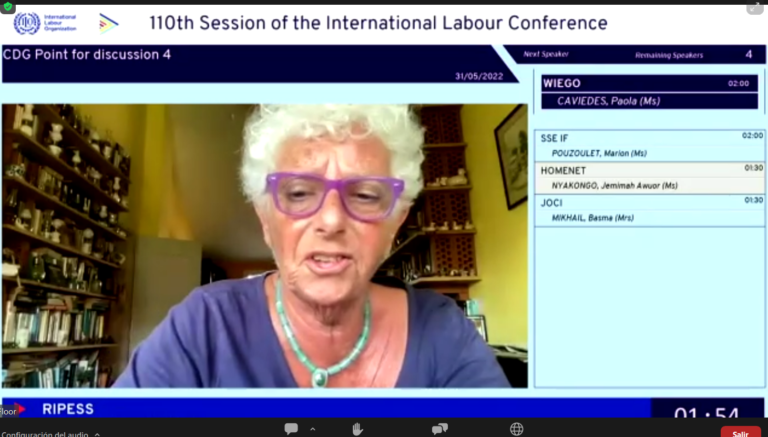RIPESS Intercontinental attended the 110th International Labour Conference as an observer for the last two weeks, having been the organisation that officially introduced the SSE at the ILO in 2009.
RIPESS welcomed the choice of the Governing body the International Labour Office, to hold the General Discussion on the topics of SSE and Decent Work amidst the current global situation of multiple crises, (Covid-19, wars, environment and climate, food and finance combined), to show that SSE is truly an approach whose time has come. The strong determination of the UN Inter-Agency Task Force on SSE, where RIPESS has been an active actor and contributor and its influence within the ILO, explain the choice of subject of this year’s conference.
An increasing number of people, including within the UN system, are considering the importance and relevance of SSE as an overall economic paradigm and alternative to capitalism,
and all SSE organisations celebrate these conclusions as an achievement: The transition towards a system in which people and the environment and all human rights are placed at the centre of all considerations, rather than the accumulation and exploitation of economic, human and environmental resources, is closer now. Thus, so are the SDGs.
The plenary session of this event brought together representatives of governments, workers and employers from 187 ILO Member States; and last Friday, 10th June 2022 they adopted the Resolution and Conclusions on Decent Work and the Social and Solidarity Economy, which is available here in several languages.

During this global meeting, RIPESS had the opportunity to present our 25 years of experience from the grassroots to the global level for the promotion of an economy by and for the people, to respond to their needs, for a life of dignity.
After these two weeks, we have jointly developed our own conclusions about these days which you can read here.
In this document, we have unraveled our history and related it to the success stories achieved over time and up to the present day. Not only did we contribute significantly during the conference as observers, we have also been working on the SSE for 25 years. This makes us very proud of the achievements of this ILC 2022, as it has and will continue to bear fruit at intercontinental and country level.
Furthermore, and in her intervention on 31 May, our representative and member of the joint co-ordination of RIPESS Intercontinental, Judith Hitchman highlighted our collective will to work towards the implementation of the ILC Conclusions at a continental and national levels, collaborating with ILO regional offices in Africa, Asia and Latin America, given our strong presence there. This was not just a response to the fourth discussion point (which asked for specific and immediate measure); but summarizing our arguments and rationale as promoters and advocates of the SSE. You can find her intervention here.
Finally, and to complete the story of our participation, we enriched the insights of the debate with our perspectives on the other 3 points of discussion. Our imput can be downloaded here.
As for the first point, the definition of Social Solidarity Economy, we propose the use of the UNTFSSE one that was adopted in 2014. This definition, based on the 2009 Johannesburg definition was agreed upon, and is the result of a collective effort of UN agencies and SSE organisations and networks.
The second point, relating to the ways in which SSE can achieve Decent work, SDGs and improve peoples’ lives,we present a quick review on the history of SSE and the history of its usage to specifically devise solutions to the problems this question addresses: we demand Government’s support for the structures that need to be increased and mainstreamed, while remaining vigilant that the governance models of SSE organisations, human rights and collective nature of SSE structures remain intact.
The third point tackles the issue of public services’ and governments’ efforts to increase the implementation of SSE as an overall solution. We give examples that clearly demonstrate that negotiations and partnerships with the State (including regions and municipal/local government levels) and different social partners are not only important, but also essential, to developing sustainable and inclusive economies. This is vital if we are to achieve large-scale decent work for all, social protection, housing for all and tackle climate change.
To conclude, the fourth point encompassed our vision and was answered mostly in our intervention, we can conclude as Judith stated: To this end, our members, on the various continents and in countries, will no doubt be happy to work on this in a spirit of solidarity with all those who wish to strengthen the SSE in their respective countries.

